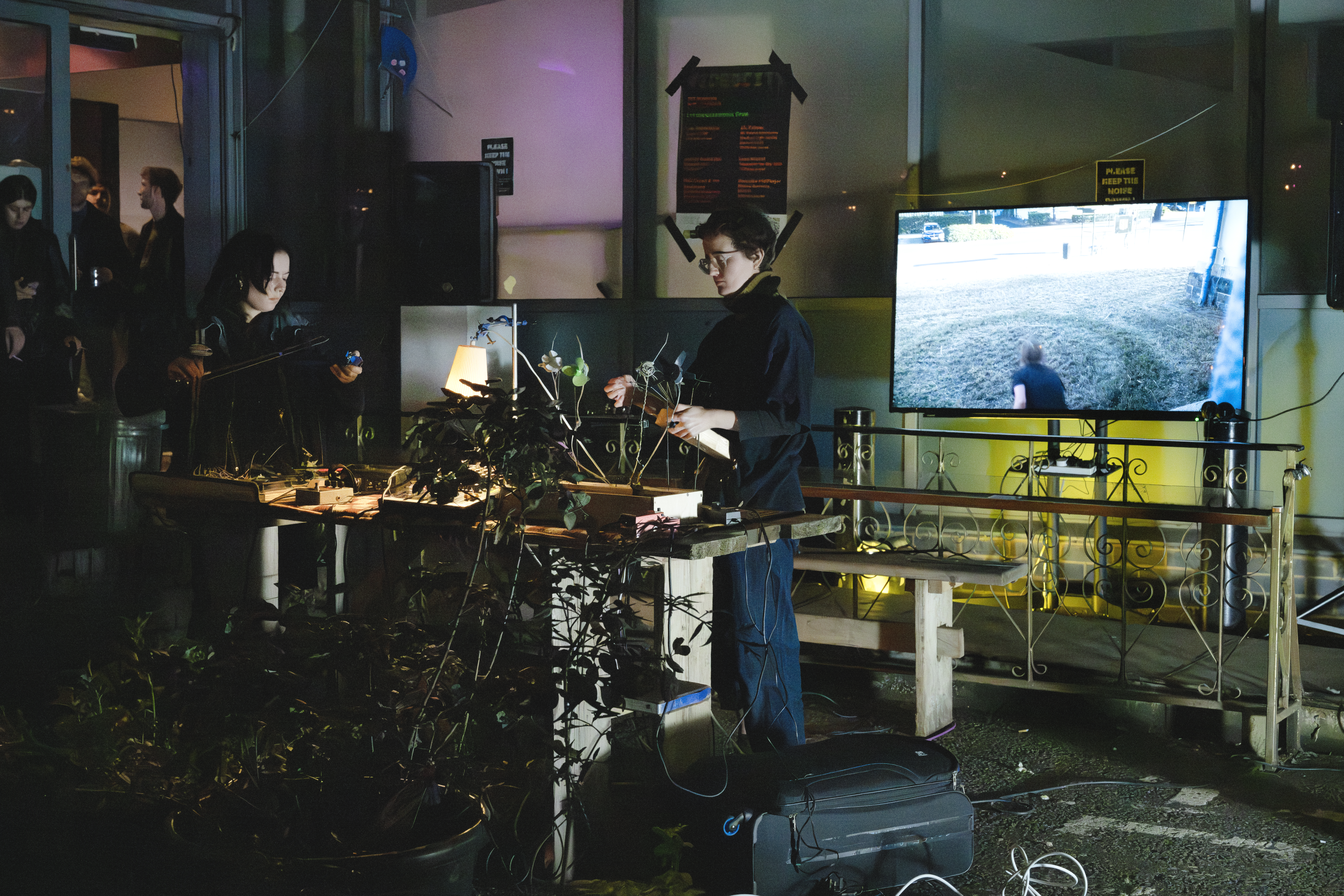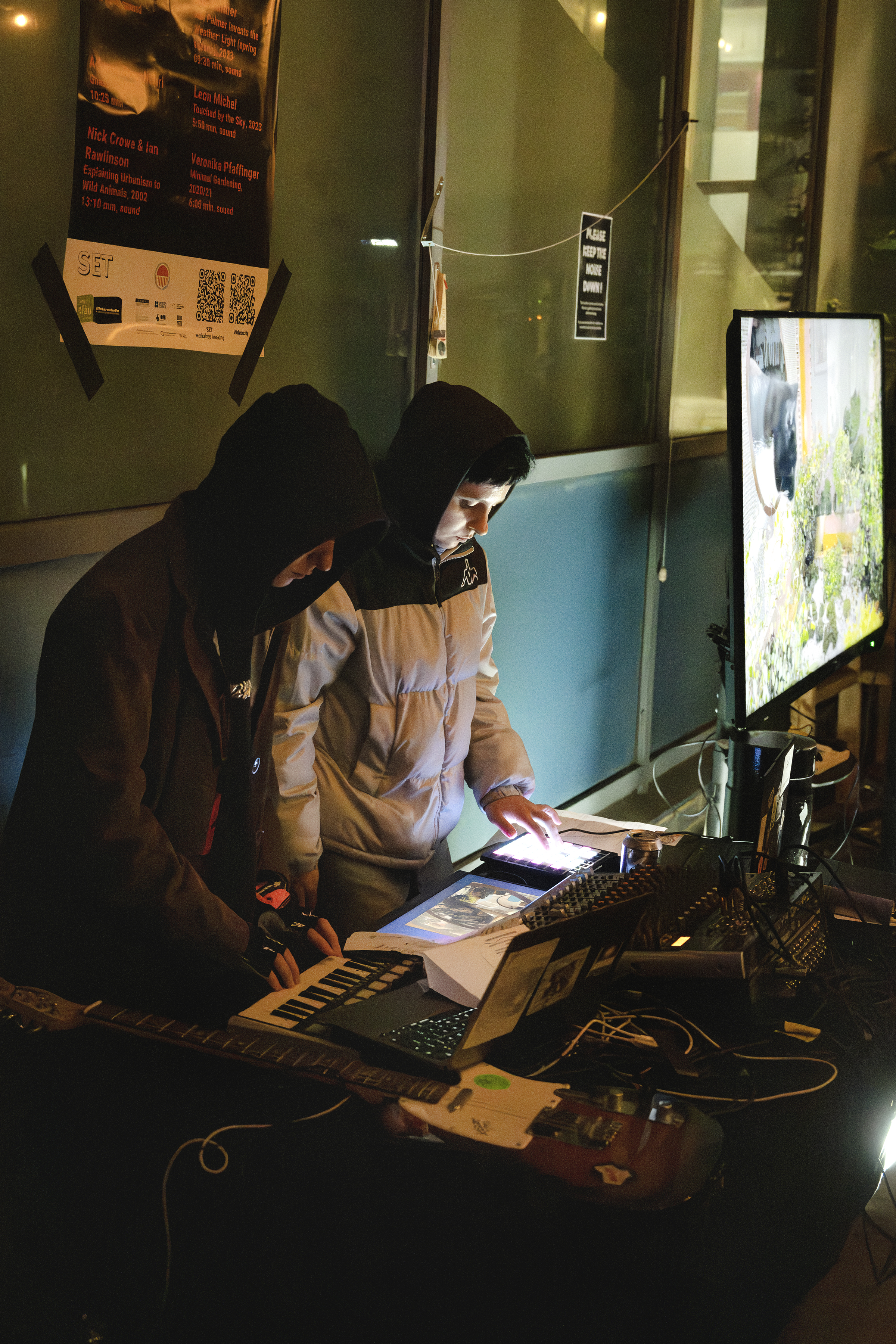“Let the Grassroots Grow” is a joint exhibition, residency and exchange programme between SET (London) and Videocity & riesa efau (Dresden). Building on last year's exchange, mutual visits were accompanied by digital research, which meant that we were able to get to know each other, learn from each other and research artists on-site.
Our joint exhibition “Let the Grassroots Grow” shows six video works by artists that the teams encountered during their research or via the wider network. The focus is on young talent and discoveries. Three artists from Germany and three from England, including a duo, who live between both countries, collaborating between Germany and the UK, are showing a total of six video works on the theme of “Simply Nature” in resonance with Videocity’s 2024 programme theme. The videos were selected in relation to the location, reflecting green spaces and the visual experiences of passers-by.
For us, bringing together video art scenes from two different regions constitutes an important gesture. Thanks to the intangible quality of video art, which enables its dissemination beyond city boundaries, we share the results with different audiences in Dresden and London and stimulate an international discussion. We believe that many are facing similar challenges in the wake of the climate crisis.

Image credit: “Let the Grassroots Grow” shown at SET Woolwich, video still by Veronika Pfaffinger, photographed by Amina Ali.
After our first exhibition at the Runde Ecke in Dresden back in May 2024, “Let the Grassroots Grow” came to London, across three of SET’s London sites and was on display at SET Tower Gateway until 12th January 2025.
The exhibition started its journey at SET Woolwich, where it was launched in the garden, resonating with our research on the role of gardens, nature and ecological activities as a meeting space for communities, ideas, and culture. The SET Woolwich garden is an important public green space for our community to gather.
The opening coincided with the annual Open Studios event, where SET’s largest studio building opens its doors and invites the community to meet artists, participate in workshops and visit exhibitions. To celebrate the first exhibition of the “Let the Grassroots Grow”, we invited two groups of artists from the studio building to respond to the video works we were showing.
Mosquito Farm, a collaboration between Maddie Banwell and Grace Black, making music and object theatre with their hand built mechanical, analogue and acoustic instruments, produced beautiful installations to be placed in the garden. These were hand-pulled fan installations which have become a permanent feature at SET Woolwich and are visible against the windows.
The idea of making fans was sparked by finding a fan left in the garden. Mosquito Farm felt that the sculptural fans: “recreate a specific action that someone might use to punctuate communication or dance… [and] we like that these are mass produced objects or freebies, they are often souvenirs, and some of them are broke, but they still try to hold on to their status as a symbol of elegance”.

Image credit: Mosquito Farm at SET Woolwich Open Studios, photography by Dominique Crawshaw.
In the evening of the Open Studios, Mosquito Farm created experimental sound pieces in response to the films within the exhibition as a live performance. Transforming found objects into an ensemble of instruments, the duo beautifully mirrored the ethos behind our project using the existence of the natural world and found materials to create a live, and refreshing performance.

Image credit: leisure fm at SET Woolwich Open Studios, photography by Dominique Crawshaw.
The second performance of the evening was by leisure fm, a twin duo who draw inspiration from dream-pop, trip-hop, alt-pop, electronica and shoegaze, yet they create a completely unique sound. Their music is full of moody, melancholic reflections and poetic ruminations set to a hazy, hypnotising backdrop of guitars, synths and mesmerising vocals. Their latest project lurks in the shadowy spaces of lost love, sadness and existential dread, plus a bit of Greek mythology and romanticism.
Their performance of live and originally composed music was performed in the garden, which they intended as a sort of live score of the films. After the event, leisure fm shared with us that: “the performance really activated the space and sitting in the garden through the night and listening to experimental music, felt like a beautiful and intentional way to share the films”.
After the launch event, we moved the screen indoors and displayed it prominently in the reception at SET Woolwich. This allowed a range of people to interact with the show and experience it on a daily basis. It was also visible through the translucent double doors of our main entrance which faced the road and street. It was beautiful to see visitors who intended to visit the site including tradespeople (electricians and delivery staff) lingering to engage with the show. It was also wonderful that there were visitors just attracted by the sight of the screen through the doors. Finally, we had continued engagement from all the wonderful members of the SET Woolwich community café, SET’s Associate membership and SET Staff.
Alongside, the initial launch we were keen to keep the ethos of the exhibition present and decided to re-engage with the garden through a workshop, this was also intended as a parallel event to the garden workshop which occurred in riesa efau. At the Woolwich community garden, we felt it was important to share the history of London as a city and have a sort of ode to grassroots gardening in city contexts, and understand their radical ethos.

Image credit: Jack Jeans, 'Radical Gardening in the City' workshop at SET Woolwich, photographed by Amina Ali.
We invited Jack Jeans from Walworth Garden, who lives in South London and is hugely inspired by the histories of “radical” and grassroots gardeners, this informs and inspires Jack’s daily practice as a horticulture tutor, community gardener and food grower in London.
Jack facilitated a unique two-part workshop exploring the crucial role played by green spaces in London: as a site for fostering community resistance to gentrification and social cleansing, and emphasising the demands of right to grow and climate justice movements.
Participants also had the opportunity to develop their practical gardening and planting experience, through seed sowings and demonstrations, and to rethink traditional approaches to gardening. Through this workshop, they also contributed to the SET Woolwich garden to provide food, flowers, forage and shelter, for the wider SET Woolwich community and local wildlife.

Image credit: Jack Jeans, 'Radical Gardening in the City' workshop at SET Woolwich, photographed by Amina Ali.
The workshop was a wonderful opportunity for the SET community to connect in a new context and allowed us to use the garden during the winter. The event was hugely popular and we had a waiting list of attendees which also demonstrated to us how keen people were to participate in the SET Woolwich garden.
This is the reflection from an attendee to Jack’s incredible workshop: “I had a fabulous time at the workshop, it was so interesting to learn about the history of radical gardening - particularly in London. It was great to learn about all the community gardens which have existed in meanwhile space, like in Elephant and Castle, this is particularly relevant to SET. We then planted loads of new plants I had never heard of, edible chrysanthemum and Rungia klossii - a herb which tastes like mushrooms! It was great planting an Akebia (chocolate vine) to grow up some dead wood in one of the beds. We also planted some mustard - green frills - which was great as now the community cafe will have tasty salad throughout winter. We also put some tall plants in like thistles for pollinators (which I learnt you can also eat like artichoke!)”.
Throughout, the period of time we had the exhibition at SET Woolwich it was important for us that the show function as more than a display, and more as a dialogue and reflection on the values behind the show. We had a range of wonderful conversations on the significance of grassroots community work, but also living in and amongst the natural world.
Blog by Amina Ali, Assistant Curator for the “Let the Grassroots Grow” Project at SET

